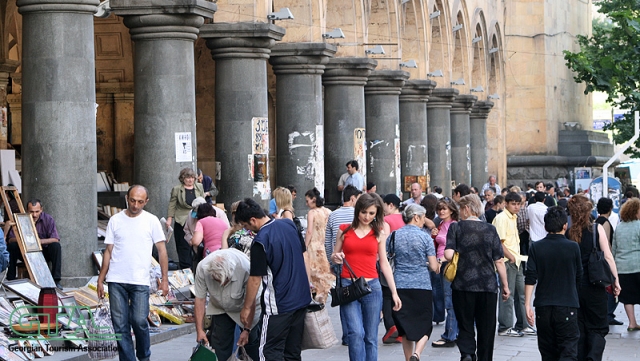Georgians Continue to Support NATO and EU Membership, Worry About Social Poverty
The majority of Georgians support NATO membership, citing primarily security, followed by economic benefits as reasons for their support, the National Democratic Institute (NDI) and CRRC Georgia survey found.
The survey was held from November 17 to December 7, 2015, through face-to-face interviews with a nationwide representative sample of 1881 completed interviews with Georgian speakers.
Foreign Affairs
According to the survey, 56% of Georgians agree Georgia will benefit from closer ties with the United States, while only 19% disagree.
When choosing between the European Union (EU) and Eurasian Union, support for the EU has increased by 11%, from 47% to 58% since the August 2015 poll.
“Georgians support the country’s European and Euro-Atlantic direction, including NATO and EU membership, and EU support has risen vis-à-vis the Eurasian Union since our August poll,” Laura Thornton, NDI’s senior country director in Georgia said.
“Citizens also see the benefits of close ties with the United States, all of which demonstrate clearly the country’s pro-Western aspirations,” she added.
This poll evaluated specific political party supporters’ views on foreign relations as well as Georgians’ trust in parties’ foreign policy credentials.
Supporters of United National Movement (UNM) and Irakli Alasania-Free Democrats (FD) voiced greater levels of support for NATO and EU membership and closer ties with the US, when compared to Georgian Dream (GD) party supporters.
According to the survey, Georgians across the spectrum do not know which party they trust most to handle foreign relations. Those who enclosed their opinion, trust UNM and FD to handle relations with the U.S., EU, and NATO, whereas they place greater trust in the Georgian Dream party and United Democratic Movement to handle relations with Russia.
Party Affiliation
Eighteen percent of citizens identified GD as the party closest to them, with 14% for UNM, and 9% for FD.
Compared to NDI’s August poll, more Georgians express an interest in voting, with likely voters having risen to 64% from 49%. However, most still do not have a preferred political party.
Sixty percent of citizens are undecided about how they would vote if elections were held tomorrow, including 50% of likely voters.
Of likely voters, 18% would vote for the Georgian Dream coalition, 12% for United National Movement, and 7 percent for Free Democrats.
Economic conditions are still leading Georgians’ minds, with jobs (57%), poverty (29 %), and pensions (28 %) selected as most important issues, and territorial integrity with 29 percent of Georgians ranking it as important.
Attitude towards current events
The survey highlights that Georgians are twice as likely to feel the country is moving in the wrong direction rather than right direction, with 44% saying the wrong direction and only 18% saying right.
Georgians identify many factors – human rights, fair elections, rule of law, freedom of speech, citizen participation as key ingredients for democratic development, but consistently rank Georgia as falling short on those indicators.
"As shown in our previous poll, the electoral playing field remains wide open. While a third party, the Free Democrats, has gained in support, no party is significantly ahead and most Georgians are undecided about their political preferences," Thornton said.
“This presents an important opportunity for all parties to spend this campaign year earning citizens’ backing through responsive platforms and policies, particularly, as revealed in this poll, with an emphasis on economic conditions and a demonstration of past performance and policy record,” she added.
NDI surveys public opinion to help Georgian stakeholders diagnose and address issues of public concern by providing accurate, unbiased and statistically-sound data. The poll was developed in consultation with party, government and civil society leaders, and aims to capture the most relevant information to foster the development of responsive policies and governance.
Photo: Georgian Tourism Association












